

Guest Speaker Seminars
The RRC organises Guest Speaker Seminars, which are open to all RRC Members.
Seminars held to date include:
Guided site visits
The River Restoration Centre offers guided tours to a number of restoration sites.
During which the Centre staff will explain the techniques used on site and the lessons
that can be learnt from this demonstration site.
Below are details of six sites that we offer visits to, however this list is not exclusive (guided site visits to other restoration sites can also be arranged for example the Parrot Catchment, the New Forest LIFE 3 restoration sites, and
Shopham Loop). If you are interested in attending a site visit to a particular
restoration site please contact the Centre.
| Tours of the River Cole Demonstration Project | |
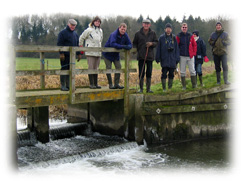 |
The River Cole restoration site at Coleshill flows through National Trust owned farmland, northeast of Swindon. The River Cole had been realigned, straightened and enlarged over centuries - originally for milling but in more recent years to safeguard agricultural production from flooding. This legacy of management is common amongst many rural rivers. Upstream of the mill the river was restored to its original course, downstream the river was reduced in size and re-meandered across the old course to create a more natural profile. |
Tours conducted within the last two years include: |
|
| Tours of the River Skerne Demonstration Project | |
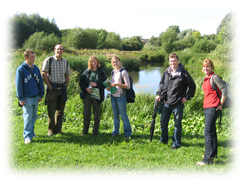 |
The River Skerne restoration project is located in the town of Darlington, Co Durham and demonstrates what can be achieved in an urban environment. The Skerne had been straightened and enlarged to reduce flooding and to drain the surrounding urban area. The restoration works, carried out in 1996, incorporated a 2km length of the river. Four new meanders were formed; riverbanks were strengthened with willow and reeds to prevent erosion; ugly surface water outfalls were replaced with underground chambers to intercept pollution; sections of the bed were re-shaped and narrowed; and new footpaths and landscaping was used to “bring the countryside into town”. |
|
|
| Tours of the River Brent Restoration Project | |
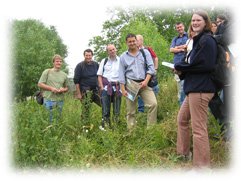 |
The River Brent restoration site is located in Tokyngton Park, Wembley, London. Immediately after World War II (around 1947) the meandering channel of the Brent in Tokyngton Park was replaced with a concrete Ushape channel as part of a flood alleviation scheme. The restoration works involved removing the concrete channel and recreating a more natural planform with a two stage channel to ensure effective conveyance of flood flows. A key element of this project was making the river a focal part of the park and involving the local community and school groups with the aim of encouraging local people to become custodians of the park. |
Tours conducted within the last two years include: |
|
| Tours of the River Quaggy, Chinbrook Meadows, Restoration Project | |
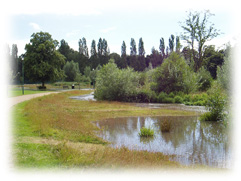 |
The River Quaggy restoration site at Chinbrook Meadows is part of a wider River Quaggy Flood Alleviation Scheme in the London Borough of Lewisham. In this section the Quaggy previously flowed through a straight concrete channel which bisected the park. In 2002 a restoration project was completed which reinstated the river into a natural open course. The project incorporated the creation of an outdoor classroom, crossing points over the river, benches and riverside paths, therefore improving the amenity value of the park and creating a safe open area as well as enhancing the physical quality of the river and providing flood relief benefits. |
Tours conducted within the last two years include: |
|
| Tours of the River Quaggy, Sutcliffe Park, Restoration Project | |
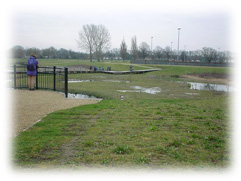 |
The River Quaggy restoration site at Sutcliffe Park is also part of the River Quaggy Flood Alleviation Scheme in the London Borough of Lewisham. At Sutcliffe Park the river was previously hidden in a culvert. However, from 2003 to 2006 a phased project was undertaken to divert the main flow of the river into a newly created watercourse across the centre of the park. The motivation for the scheme was to create a flood storage area in order to relieve pressure from urban areas downstream such as Lewisham which had previously been affected by significant flooding problems, most notably in 1968 when the town centre was flooded to a depth in excess of 1m. |
|
|
| Tours of the River Pinn Restoration Project | |
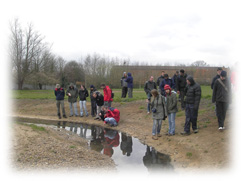 |
The River Pinn runs through Hatch End in North West London. Like many urban rivers it has been subject to culverting, straightening and lining with concrete along many parts of its length. In 2006 a 600m section of the Pinn through Hatch End Playing Fields, was restored from an old brick culvert and a concrete lined channel to a more natural watercourse. The main motivation for the project was to relieve flooding pressures from adjacent urban areas by creating a natural flood |
|
|